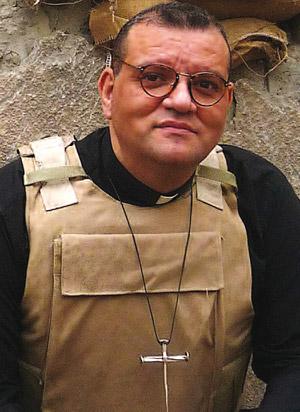
LOS ANGELES, CA (Catholic Online) – "ISIS has plants in Baghdad. That’s why the archbishop wanted us gone. The other day, they discovered 150 bodies of people who had been shot. Nobody knows who did it, but we know that ISIS is already operating in Baghdad," White said in a recent interview. White related how the Islamic State burst into the house of one of "his families" and offered the parents a choice: "Convert right now or we will kill your children in front of you."
Visiting a different family, White recalls, "The kids were told to convert or be killed. They refused. There were four of them from 15-years old and younger. They beheaded all of them," he related crying. "They were all our children. That is how evil these people are. So evil. They have no respect for anyone. The other day, they chopped a four-year old boy in half. He didn’t do anything. What can a four-year old boy do? He was just a boy ."
The 50-year-old Anglican vicar, from London is the president of the Foundation for Relief and Reconciliation in the Middle East, an aid and advocacy group that works for peace between different religious groups in the Middle East. The foundation, which has 260 centers around the world, has worked with Nigerian Christians and Muslims, Israelis and Palestinians and different groups in Germany.
White first arrived in Baghdad in 1998. Diagnosed with multiple sclerosis, or MS White elected to stay regardless. Saddam Hussein was still in power at the time and the international sanctions had created crushing poverty in the country. Even though gas was less than four cents per gallon, the normal monthly salary then was $2.
White remembers life under Saddam. "Everyone was in fear of everyone else. But you could walk around, live your life normally," he remembers. "It was just like life behind the Iron Curtain, nobody knew who they could trust. Secret police were everywhere."
In spite of this, Saddam was very good to the Christians and there was very little persecution of Christians or other minorities during his reign. Saddam was a Sunni, a minority in Iraq, so he needed the other minorities to help him maintain power.
Immediately after the Second Gulf War and the deposing of Saddam, "There was jubilation," White remembers. "Everybody was happy. They were free at last. When the statue [of Saddam] was brought down, everybody thought there was hope for their future."
The jubilation lasted only about six months. As the Sunni and Shiites began vying for power, the situation deteriorated. The Americans had set up the Coalition Provision Authority to rule the country with representation from Sunnis, Shiites and minorities.
"After a year and a half, the CPA left Iraq and handed over the Iraqi government [to the Iraqis]. Shiites, for the first time ever, became the controlling force," White relates. "There was never was any real tension beforehand, but as things developed, the tensions got greater and greater. We also saw corruption from those taking power. The Shiites came to power through the Dawa party. That started the tension with the Sunnis."
White believes that "terrorism is always started when somebody loses power."
White plans to return to Iraq as soon as possible. "But for the time being, I will have to go back to Irbil (in Iraqi Kurdistan). Irbil is very safe, compared to everywhere else."



